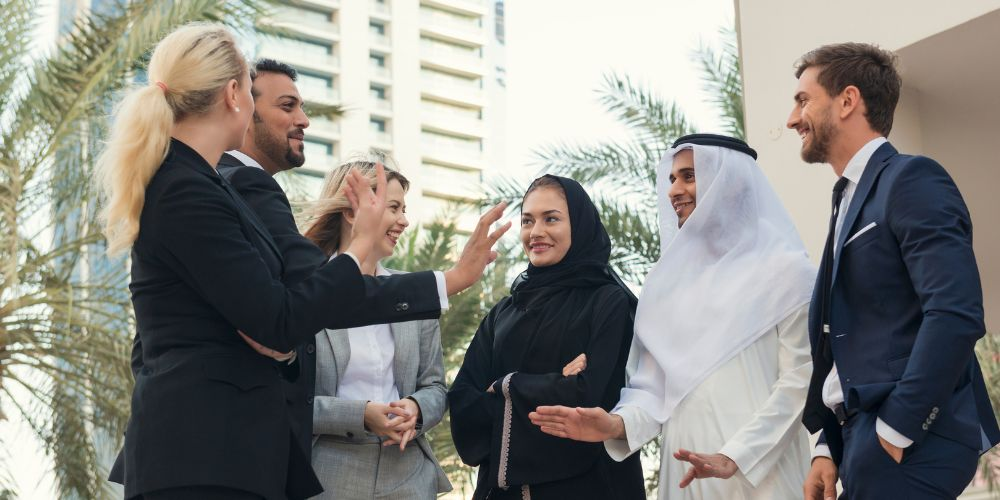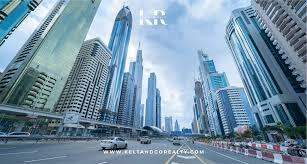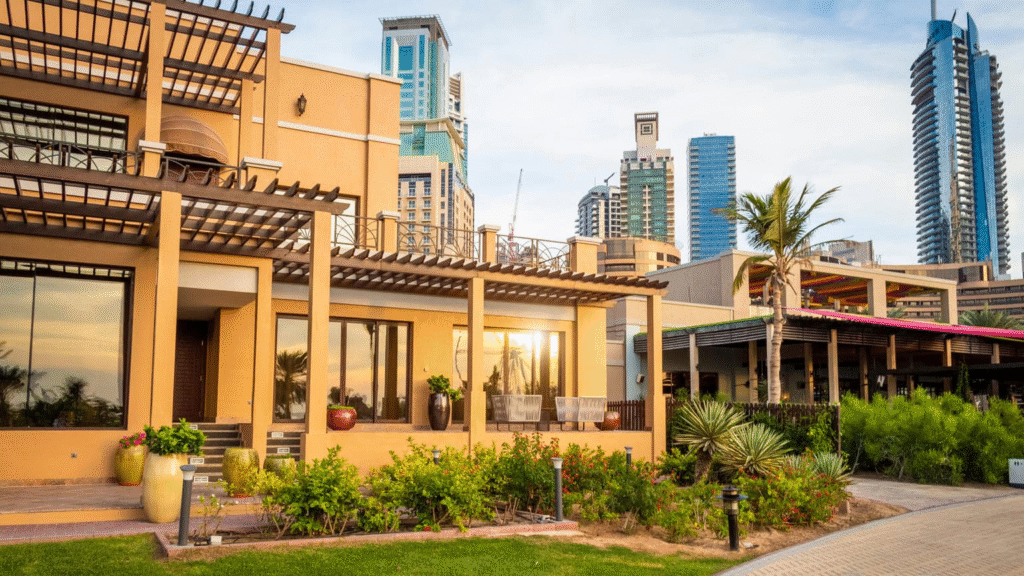Now Reading: Can Foreigners Buy Commercial Property in Dubai? A 2025 Guide
-
01
Can Foreigners Buy Commercial Property in Dubai? A 2025 Guide
Can Foreigners Buy Commercial Property in Dubai? A 2025 Guide

Table of Contents
Foreigners Buy Commercial Property: Dubai’s real estate market in 2025 is a global powerhouse, with 94,000 residential transactions worth AED 262.7 billion in H1, up 23.04% year-on-year, per Dubai Land Department (DLD) data. While residential properties dominate, commercial properties in freehold zones, enabled by Decree No. 3 of 2006, attract foreign investors with 6–10% rental yields, 5–12% capital appreciation, and tax-advantaged returns.
With 4 million residents, 25 million tourists, and infrastructure like the Blue Line Metro, Dubai’s commercial hubs like Business Bay and DIFC are thriving. This guide explores whether foreigners can buy commercial property in Dubai, key considerations, and steps to ensure a secure investment in 2025, drawing from sources like Bayut, Property Finder, and DLD.
Can Foreigners Buy Commercial Property in Dubai?

Yes, foreigners can purchase commercial properties in Dubai’s designated freehold zones with full ownership rights, including perpetual ownership transferable to heirs, under Decree No. 3 of 2006. Commercial properties include office spaces, retail units, warehouses, and hotel apartments in areas like Business Bay, Dubai International Financial Centre (DIFC), Jumeirah Lakes Towers (JLT), and Dubai South.
Unlike residential properties, commercial purchases incur 5% VAT, and rental income may face 9% corporate tax if held by a UAE company and exceeding AED 375,000 annually. Foreigners face no ownership restrictions, and properties can be bought remotely via digital platforms, making Dubai a viable option for international investors seeking high-yield commercial assets.
Key Freehold Zones for Commercial Property
Foreigners can invest in commercial properties in several freehold zones known for business activity and returns:
- Business Bay: Offices and retail from AED 1 million, yielding 6–8%. Central location near Downtown Dubai drives demand from startups and corporates.
- Dubai International Financial Centre (DIFC): Premium offices from AED 2.5 million, yielding 5–7%. A financial hub with 0% corporate tax for free zone entities.
- Jumeirah Lakes Towers (JLT): Offices and retail from AED 800,000, yielding 7–9%. Affordable hub with DMCC Free Zone benefits.
- Dubai South: Warehouses and offices from AED 500,000, yielding 8–10%. Emerging logistics hub near Al Maktoum Airport.
- Sheikh Zayed Road: High-rise offices from AED 1.5 million, yielding 6–8%. Prestigious address with strong corporate demand.
Verify freehold status via the DLD portal or title deed, ensuring it specifies “freehold” for full ownership rights.
Key Considerations for Foreign Buyers
1. Investment Potential
- Rental Yields: Commercial properties yield 6–10%, higher than many global markets (e.g., London: 3–5%). JLT offices yield 7–9% (e.g., AED 72,000/year for a AED 800,000 unit), while Dubai South warehouses yield 8–10% due to logistics demand.
- Capital Appreciation: Business Bay and DIFC offer 5–12% gains, driven by infrastructure like the Blue Line Metro and Etihad Rail. Dubai South sees 5–10% growth due to Al Maktoum Airport expansion.
- Demand Drivers: Dubai’s 25 million tourists and 4 million residents fuel retail demand in Business Bay, while DIFC and JLT attract multinationals. Dubai South serves logistics firms near Expo 2020.
- Market Tools: Use DXB Interact, Property Finder, and Bayut to analyze rental demand and pricing trends.
2. Tax Implications
- VAT: A 5% VAT applies to commercial property purchases and leases (e.g., AED 50,000 on a AED 1 million office), unlike VAT-exempt residential properties.
- Corporate Tax: Rental income over AED 375,000/year held by a UAE company incurs 9% corporate tax, introduced in 2023. DIFC/DMCC free zone companies may qualify for 0% tax if compliant with free zone rules. Individual ownership avoids this tax.
- No Capital Gains Tax: Profits from selling commercial properties are tax-free in Dubai, unlike the UK (18–28%) or US (15–20%).
- Home Country Taxes: UK, US, or Indian buyers may face capital gains or rental income tax. UAE’s double taxation agreements (DTAs) with over 100 countries reduce liabilities. Consult a tax advisor for compliance with the Federal Tax Authority (FTA) and home country regulations.
3. Costs and Fees
- DLD Transfer Fee: 4% of purchase price, often split with the seller (e.g., AED 40,000 for a AED 1 million property).
- Registration Fees: AED 4,200 for properties over AED 500,000, plus AED 540 knowledge fee and AED 250 ownership certificate fee.
- Agent Commission: 2% plus 5% VAT (e.g., AED 21,000 for a AED 1 million property).
- Mortgage Fees: 0.25% of loan amount plus AED 290 (e.g., AED 2,790 for a AED 1 million loan). Bank valuation fees: AED 2,500–5,000.
- Service Charges: AED 10–30 per sq. ft. annually (e.g., AED 20,000/year for a 1,000 sq. ft. office at AED 20/sq. ft.).
- Municipality Market Fee: 5% of annual rental value, paid by owners (e.g., AED 5,000/year for AED 100,000 rent).
- Total Upfront Costs: 6–8% of purchase price (e.g., AED 60,000–80,000 for a AED 1 million property). Ongoing costs: 1–2% annually.
4. Financing Options
- Mortgages: Non-residents can secure 50–60% loan-to-value mortgages at 3–5% rates from UAE banks (e.g., Emirates NBD, HSBC). Provide passport, 3–6 months’ bank statements, salary certificates, and an Al Etihad Credit Bureau report (AED 100).
- Off-Plan Payment Plans: Developers offer 60/40 or 50/50 plans for off-plan commercial projects (e.g., AED 100,000 deposit for a AED 1 million office). Verify milestones via DLD reports.
- Currency Risk: Use UAE-based forex services to lock in exchange rates for international transfers, minimizing fluctuations.
5. Legal and Regulatory Framework
- Freehold Ownership: Grants perpetual rights, transferable to heirs. Register a DIFC will to avoid Sharia-based inheritance laws.
- Escrow Accounts: Mandatory for off-plan commercial projects under Law No. 8 of 2007, protecting deposits (e.g., AED 100,000 for a 10% deposit). Verify via DLD.
- Licensing: Commercial properties require a trade license for rental or business use, obtainable via DED or free zones like DMCC (fees: AED 10,000–50,000).
- Compliance: Register SPAs with DLD (AED 1,000–2,000) and verify title deeds to ensure legal ownership. Use RERA-registered agents, verifiable via the Dubai REST app, to avoid fraud (150+ cases in 2024).
6. Risks and Mitigation

- Market Fluctuations: Oversupply in Dubai South may soften yields. Mitigation: Target established zones like DIFC or Business Bay with 90%+ occupancy.
- Developer Delays: Off-plan projects carry a 5–10% delay risk (2024 data). Mitigation: Choose reputable developers (e.g., Emaar, DAMAC) and verify escrow via DLD.
- Fraud: Scams include fake listings. Mitigation: Use RERA-registered agents and confirm title deeds/escrow via DLD.
- Tenant Risk: Corporate tenants may default. Mitigation: Screen tenants via Ejari registration (AED 220) and secure deposits (1–2 months’ rent).
Steps to Buy Commercial Property in Dubai as a Foreigner
- Research Freehold Zones: Focus on Business Bay, DIFC, or JLT for high yields (6–9%) or Dubai South for affordability (8–10%).
- Engage Professionals: Hire RERA-registered agents and legal advisors to source properties and review SPAs. Verify credentials via Dubai REST app.
- Verify Credentials: Check developer ratings and escrow accounts for off-plan projects via DLD. Request NOCs for ready properties to confirm no dues.
- Secure Financing: Obtain mortgage pre-approval or leverage off-plan payment plans. Use forex services for transfers.
- Sign SPA and Pay Deposit: Sign the SPA digitally and pay 10–20% deposit to the seller or escrow account. Register SPA with DLD.
- Complete Purchase: Pay remaining balance, 4% DLD fee, 5% VAT, and registration fees at a DLD office or remotely via agents. Obtain title deed.
Strategic Tips for Foreign Buyers
- Target high-demand zones like JLT (7–9% yields) or DIFC (5–7% with tax benefits) for stable returns.
- Budget for 6–8% upfront fees and 5% VAT on purchases, plus 1–2% annual costs (service charges, market fees).
- Optimize rentals via Ejari for long-term leases (6–9%) or holiday permits for hotel apartments (8–10%) per Dubai Smart Rental Index 2025.
- Mitigate risks by verifying escrow, title deeds, and developer credentials via DLD.
- Use DIFC/DMCC free zone companies to minimize 9% corporate tax on high rental income.
- Monitor trends via DXB Interact, Bayut, and Property Finder. Track infrastructure like Blue Line Metro via RTA Dubai App for appreciation potential.
- Engage RERA-registered professionals and tax advisors to navigate regulations and DTAs with over 100 countries.
Conclusion
Foreigners can confidently buy commercial property in Dubai’s freehold zones in 2025, enjoying 6–10% rental yields, 5–12% capital gains, and tax-advantaged returns. Business Bay, DIFC, JLT, and Dubai South offer diverse options for offices, retail, and warehouses, driven by Dubai’s economic growth and infrastructure.
By understanding VAT, corporate tax, and financing options, and mitigating risks through DLD verification and professional guidance, foreign investors can secure high-return assets. Leveraging digital tools and DXB Interact ensures informed decisions, making Dubai’s commercial property market a lucrative opportunity for foreigners in 2025.
read more: Dubai Real Estate: What Foreign Buyers Need to Know in 2025






















